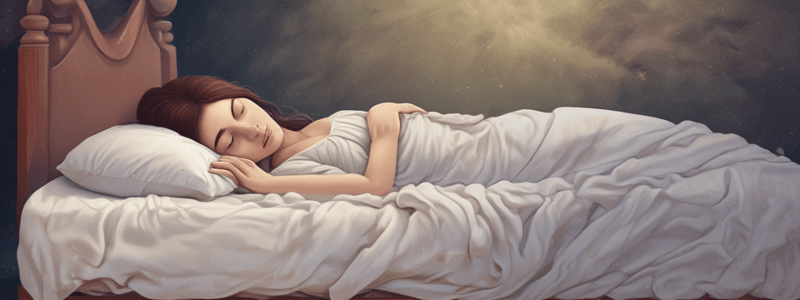Podcast
Questions and Answers
What personality trait is most closely related to anxiety?
What personality trait is most closely related to anxiety?
- Agreeableness
- Conscientiousness
- Neuroticism (correct)
- Extraversion
How does high neuroticism affect coping with stress?
How does high neuroticism affect coping with stress?
- Enhances coping abilities
- No impact on coping
- Reduces sensitivity to stress
- Leads to poor coping (correct)
What was observed as a reaction following a traumatic lightning strike?
What was observed as a reaction following a traumatic lightning strike?
- Nocturnal enuresis (correct)
- Appetite loss
- Daytime sleepiness
- Anxiety attacks
According to the study on Personality & Sleep Problems, what is the relationship between neuroticism and sleep?
According to the study on Personality & Sleep Problems, what is the relationship between neuroticism and sleep?
What personality trait predicts better sleep according to the study on Personality & Sleep Problems?
What personality trait predicts better sleep according to the study on Personality & Sleep Problems?
What do high-trait ruminators continuously think about?
What do high-trait ruminators continuously think about?
High neuroticism is not linked with poor coping with stress.
High neuroticism is not linked with poor coping with stress.
Daily hassles do not mediate the relationship between personality and sleep.
Daily hassles do not mediate the relationship between personality and sleep.
Stress can never cause a return to bedwetting in individuals who have recovered from PNE.
Stress can never cause a return to bedwetting in individuals who have recovered from PNE.
High-trait ruminators in rumination condition did not report more sleep disturbances.
High-trait ruminators in rumination condition did not report more sleep disturbances.
Bladder contractions in children with psychogenic nocturnal enuresis were induced experimentally by emotional stress.
Bladder contractions in children with psychogenic nocturnal enuresis were induced experimentally by emotional stress.
Match the following with their corresponding study findings:
Match the following with their corresponding study findings:
What is the main characteristic of Dyssomnias?
What is the main characteristic of Dyssomnias?
Which group of disorders are considered manifestations of CNS activation?
Which group of disorders are considered manifestations of CNS activation?
What is a common symptom of Bruxism?
What is a common symptom of Bruxism?
Which sleep disorder is characterized by periods of extreme somnolence?
Which sleep disorder is characterized by periods of extreme somnolence?
What distinguishes Parasomnias from Dyssomnias?
What distinguishes Parasomnias from Dyssomnias?
Who is more likely to experience Hypersomnia according to the text?
Who is more likely to experience Hypersomnia according to the text?
How does daytime stress impact sleep according to the text?
How does daytime stress impact sleep according to the text?
What is the relationship between sleep deprivation and cortisol levels?
What is the relationship between sleep deprivation and cortisol levels?
How does high-strain work affect sleep quality?
How does high-strain work affect sleep quality?
What is the relationship between pre-sleep emotion and sleep interruptions?
What is the relationship between pre-sleep emotion and sleep interruptions?
How does low body capacity due to stress affect susceptibility to illness?
How does low body capacity due to stress affect susceptibility to illness?
What impact does marital stress have on sleep according to the text?
What impact does marital stress have on sleep according to the text?
What did the study find regarding stress and nocturnal enuresis in children?
What did the study find regarding stress and nocturnal enuresis in children?
How is hypersomnia typically associated with symptoms of depression?
How is hypersomnia typically associated with symptoms of depression?
What is the relationship between self-reported bruxism and stress symptoms?
What is the relationship between self-reported bruxism and stress symptoms?
How does psychological abuse in sleep partners relate to sleep problems?
How does psychological abuse in sleep partners relate to sleep problems?
What did soldiers with extreme physical stress experience in relation to hypersomnia?
What did soldiers with extreme physical stress experience in relation to hypersomnia?
How do individuals with bruxism differ in coping strategies compared to those without?
How do individuals with bruxism differ in coping strategies compared to those without?
What did the study on Personality & Sleep Problems find regarding the relationship between neuroticism and sleep quality?
What did the study on Personality & Sleep Problems find regarding the relationship between neuroticism and sleep quality?
In the study on Rumination & Sleep, what did high-trait ruminators in the rumination condition report more of compared to low-trait ruminators?
In the study on Rumination & Sleep, what did high-trait ruminators in the rumination condition report more of compared to low-trait ruminators?
Which factor mediated the relationship between neuroticism, conscientiousness, and sleep in the study on Personality & Sleep Problems?
Which factor mediated the relationship between neuroticism, conscientiousness, and sleep in the study on Personality & Sleep Problems?
What did cognitive pre-sleep activity do according to the text?
What did cognitive pre-sleep activity do according to the text?
Flashcards are hidden until you start studying
Study Notes
Sleep Stages
- NREM (Non-Rapid Eye Movement) Stage 1:
- Occurs when you first fall asleep; half asleep/half awake
- Lasts for around 10 minutes (5%)
- Very easy to be woken up when in Stage 1 of sleep
- Brain activity goes from Alpha waves to Theta waves
- NREM Stage 2:
- Lasts for about 30 to 60 minutes
- Accounts for 50% of total sleep time
- Harder to be woken up from in this stage of sleep
- May begin to see Delta waves in this stage
- NREM Stage 3:
- Deep sleep stage
- Hardest stage to wake up from
- Lasts for about 20 to 30 minutes during the first cycle of sleep and then less and less in each cycle
- Accounts for about 20% of total sleep time
- REM (Rapid Eye Movement) Sleep:
- REM sleep is the final stage in a sleep cycle
- During this stage:
- Heart rate, breathing, and blood pressure all fluctuate
- Eyes move rapidly
- Muscles twitch
- A fast pattern of brain waves can be observed
- Dreaming occurs
- Most muscles are paralyzed during this stage so that you can’t act out your dreams
- Accounts for 25% of total sleep time
Circadian Rhythms
- Circadian rhythm: a biological clock that helps control many aspects of your body, including your sleep/wake cycle
- It controls the timing of sleep-wake patterns and the duration of sleep
- If body temperature doesn’t drop, it’s a risk factor for heart disease
- Affected by:
- Jet lag
- Daylight savings
- Shift work
- Takes days to adjust
Sleep Theories: Why Do We Sleep?
- Restoration:
- The proper functioning of our immune system is dependent upon sleep
- Sleep restores the body
- Without sleep = collapse
- Ontogenesis:
- REM sleep allows for the development of brain through preventing apoptosis in the developing brain
- The more REM sleep = less brain cell death
- REM sleep helps with brain maturation through neural activity in the developing brain
- Learning and Memory:
- Many studies have shown that sleep affects memory, mainly that sleep deprivation hinders working memory
Sleep Disorders
- Divided into 3 categories:
- Dyssomnias
- Parasomnias
- Sleep Disorders Associated with Mental, Neurologic, or Other Medical Disorders
- Dyssomnias:
- Disorders that produce either difficulty initiating or maintaining sleep or excessive sleepiness
- Divided into three groups of disorders:
- Intrinsic sleep disorders
- Extrinsic sleep disorders
- Circadian rhythm sleep disorders
- Related to stress
- Parasomnias:
- Disorders that intrude into the sleep process and are not primarily disorders of sleep and wake states per se
- Manifestations of central nervous system activation
- Divided into 3 subgroups:
- Arousal Disorders
- Sleep-Wake Transition Disorders
- Parasomnias Usually Associated with REM Sleep
- Other Parasomnias
- Not affected by stress, related to nervous system
Insomnia
- Types:
- Mild Insomnia
- Moderate Insomnia
- Severe Insomnia
- Characteristics:
- Insufficient sleep and not feeling rested
- Almost nightly, nightly, or nightly
- Social/Occupational Impairment: very little or none, mild to moderate, severe
- Restless, Irritable, Daytime Fatigue: sometimes, always, severe
Psychophysiologic Insomnia
- Physiological/psychological arousal preventing sleep
- Stress and worry about being able to go to sleep inhibits sleep from occurring
- Sleep is now associated with stress
- Bed is now associated with a place where you cannot relax
- No phone, no TV
Hypersomnia
- Characterized by periods of extreme somnolence; 18 to 20 hours a day
- Can last several days to several weeks
- More common in males than females
Bruxism
- Grinding and clenching teeth while sleeping
- Results in tooth wear, jaw pain, headaches, and complaints from co-sleepers
- 5% of population grind their teeth
- Related to stress
Sleep Enuresis
-
Also known as “Bed-Wetting”
-
Must be persistent after the age of 5
-
Very rare in adults
-
Bidirectional Relationship of Stress & Sleep:
- HPA axis regulation and changes in sleep have a bidirectional relationship
- Daytime stress leads to poor sleep, which can lead to increased daytime stress### Stress and Sleep
-
The bidirectional relationship between stress and sleep can create a downward spiral, where stress leads to poor sleep, and poor sleep leads to increased daytime stress.
-
Allostatic load, a measure of the body's capacity to handle stress, can decrease due to stress, making it easier to get sick.
-
HPA axis regulation and changes in sleep have a bidirectional relationship, with daytime stress leading to poor sleep, and poor sleep leading to increased daytime stress.
HPA Axis and Sleep
- Increased corticosterone and ACTH following sleep deprivation have been found in studies.
- Sleep problems can lead to higher cortisol levels in response to a stressor, resulting in daytime sleepiness and sleep-wake problems.
Stress and Sleep Disorders
- Stress can lead to insomnia, characterized by difficulty initiating or maintaining sleep, or excessive sleepiness.
- Stress can also contribute to hypersomnia, characterized by periods of extreme somnolence, and bruxism, characterized by grinding and clenching teeth while sleeping.
- Nocturnal enuresis, also known as bed-wetting, can be triggered by stress in individuals who have previously recovered from it.
Sleep Disorders
- Dyssomnias are sleep disorders that produce either difficulty initiating or maintaining sleep or excessive sleepiness.
- Parasomnias are disorders that intrude into the sleep process, such as arousal disorders, sleep-wake transition disorders, and parasomnias usually associated with REM sleep.
- Sleep disorders associated with mental, neurologic, or other medical disorders include insomnia, hypersomnia, and sleep enuresis.
Personality and Sleep
- Personality may mediate the relationship between stress and sleep, with neuroticism (N) being the personality trait most closely resembling anxiety.
- High neuroticism is linked with poor coping with stress, poor sleep, and more daytime sensitivity to poor sleep.
- Conscientiousness (C) may mediate the consequences of N and bad sleep, with high-N, low-C individuals being most sensitive to the effects of bad sleep.
Rumination and Sleep
- Rumination, continuously thinking about problems, can negatively impact sleep quality.
- High-trait ruminators in rumination conditions report poor sleep quality and more sleep disturbances.
- Cognitive pre-sleep activity may increase arousal levels, leading to poor sleep.
Studying That Suits You
Use AI to generate personalized quizzes and flashcards to suit your learning preferences.




